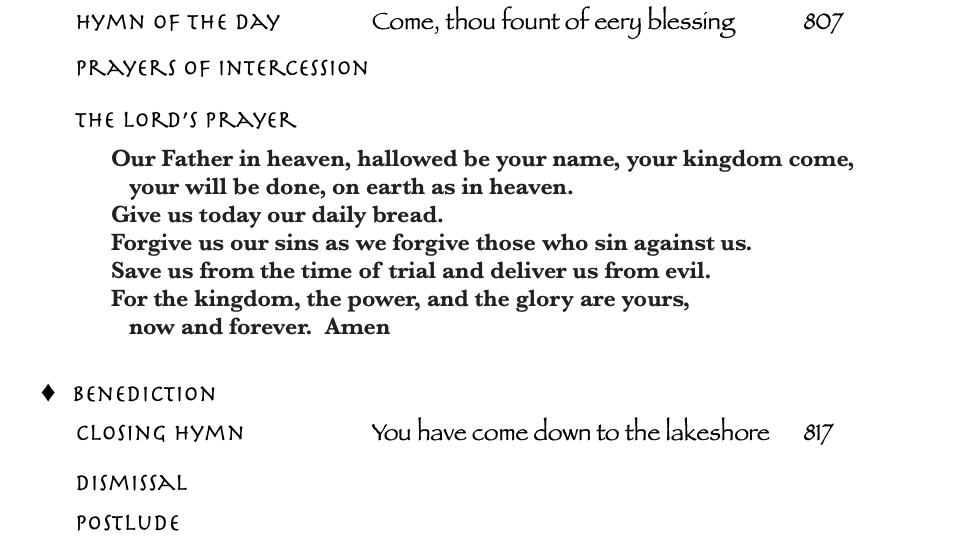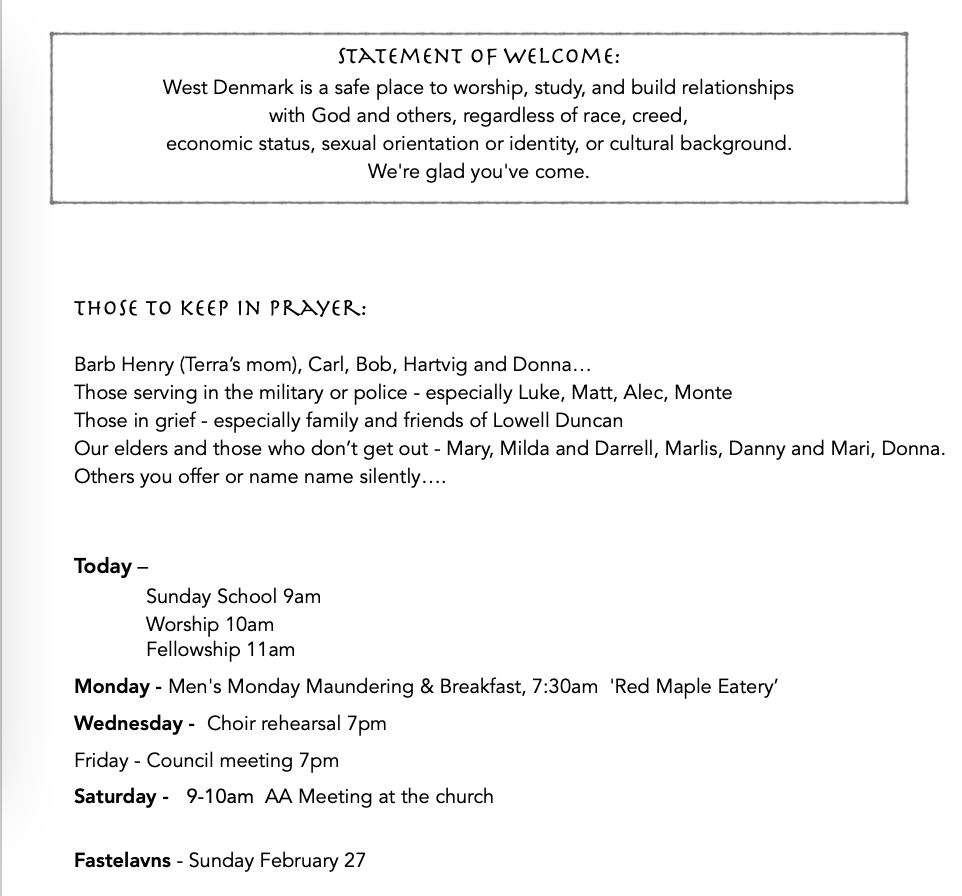Audio Recording
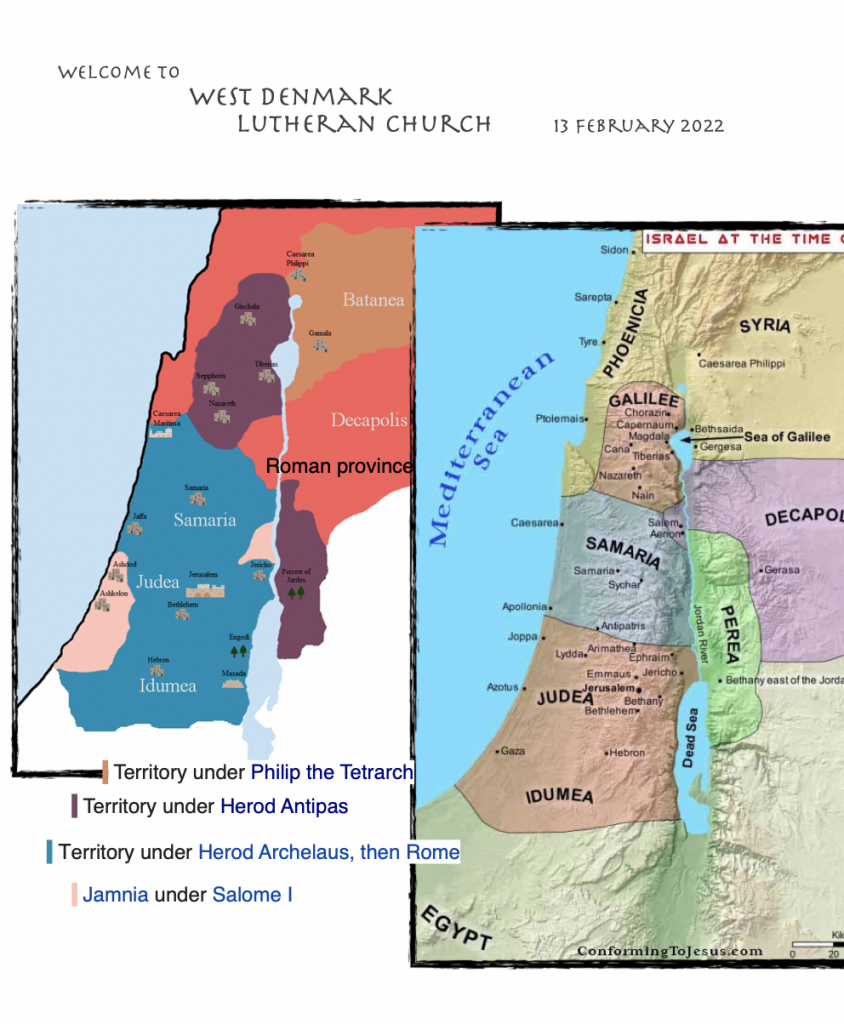
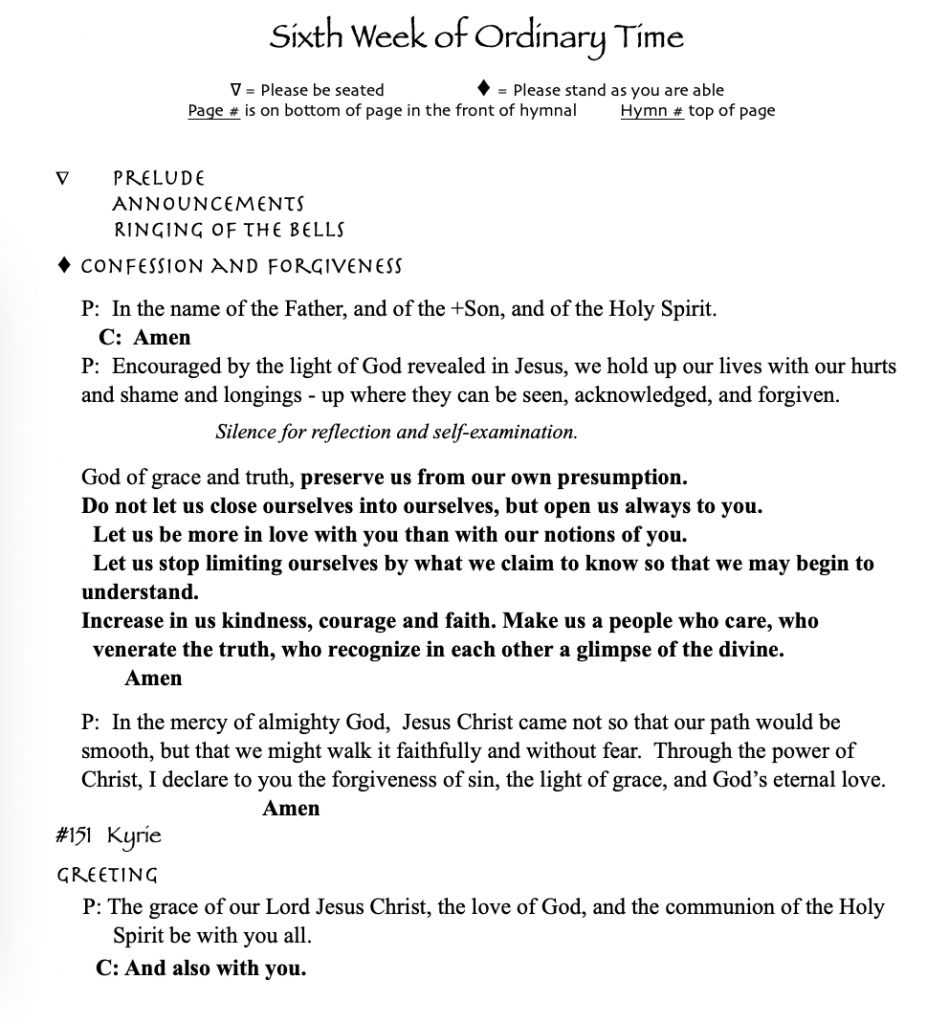
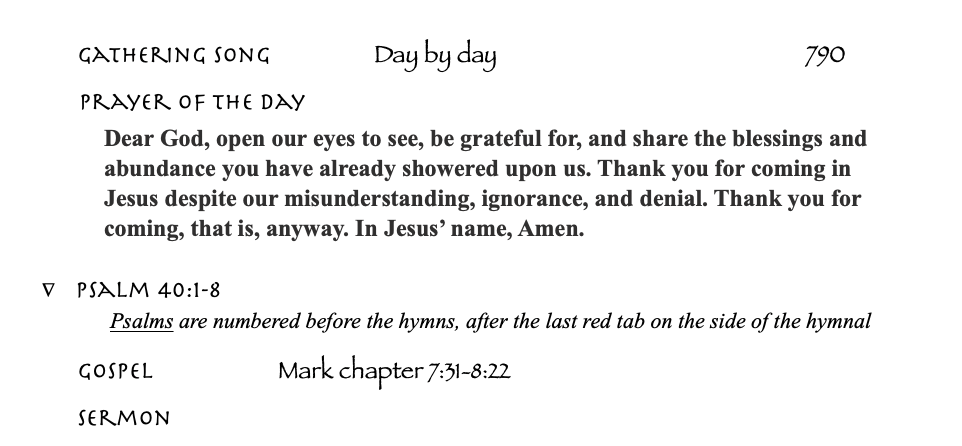
Mark 7:31-8:22
7:31Then he returned from the region of Tyre, and went by way of Sidon towards the Sea of Galilee, in the region of the Decapolis. 32They brought to him a deaf man who had an impediment in his speech; and they begged him to lay his hand on him. 33He took him aside in private, away from the crowd, and put his fingers into his ears, and he spat and touched his tongue. 34Then looking up to heaven, he sighed and said to him, ‘Ephphatha’, that is, ‘Be opened.’ 35And immediately his ears were opened, his tongue was released, and he spoke plainly. 36Then Jesus ordered them to tell no one; but the more he ordered them, the more zealously they proclaimed it. 37They were astounded beyond measure, saying, ‘He has done everything well; he even makes the deaf to hear and the mute to speak.’
8:1 In those days when there was again a great crowd without anything to eat, he called his disciples and said to them, 2‘I have compassion for the crowd, because they have been with me now for three days and have nothing to eat. 3If I send them away hungry to their homes, they will faint on the way—and some of them have come from a great distance.’ 4His disciples replied, ‘How can one feed these people with bread here in the desert?’ 5He asked them, ‘How many loaves do you have?’ They said, ‘Seven.’ 6Then he ordered the crowd to sit down on the ground; and he took the seven loaves, and after giving thanks he broke them and gave them to his disciples to distribute; and they distributed them to the crowd. 7They had also a few small fish; and after blessing them, he ordered that these too should be distributed. 8They ate and were filled; and they took up the broken pieces left over, seven baskets full. 9Now there were about four thousand people. And he sent them away. 10And immediately he got into the boat with his disciples and went to the district of Magdala.
The Pharisees came and began to argue with him, asking him for a sign from heaven, to test him. 12And he sighed deeply in his spirit and said, ‘Why does this generation ask for a sign? Truly I tell you, no sign will be given to this generation.’ 13And he left them, and getting into the boat again, he went across to the other side.
Now the disciples had forgotten to bring any bread; and they had only one loaf with them in the boat. 15And he cautioned them, saying, ‘Watch out—beware of the yeast of the Pharisees and the yeast of Herod.’ 16They said to one another, ‘It is because we have no bread.’ 17And becoming aware of it, Jesus said to them, ‘Why are you talking about having no bread? Do you still not perceive or understand? Are your hearts hardened? 18Do you have eyes, and fail to see? Do you have ears, and fail to hear? And do you not remember? 19When I broke the five loaves for the five thousand, how many baskets full of broken pieces did you collect?’ They said to him, ‘Twelve.’ 20‘And the seven for the four thousand, how many baskets full of broken pieces did you collect?’ And they said to him, ‘Seven.’ 21Then he said to them, ‘Do you not yet understand?’ Then they came to Bethsaida.
This is another week of maps gracing our bulletin cover. I probably spent too much time trying to find a clear description of what was considered Jewish or Gentile lands in Jesus’ day. It may not actually be as pertinent as it seemed to me at the time – but, still, I find history and maps helpful.
Herod the Great was the ruler of all these lands at the time of Jesus’ birth and died in the year 4 of our CommonEra. Rome adjudicated his will and divided the kingdom among his four children: Herod Antipas became tetrarch of Galilee and Perea. This is the Herod who had John the Baptist killed and who washes his hands of Jesus’ death. Archelaus was given the lion’s share of the property (the blue part), but he lost it. He brutally crushed a revolt by the Pharisees at the beginning of his reign and after ruling for just 10 years was removed from power by emperor Augustus in the year 6 CE, following complaints about his cruelty and his offenses against Mosaic law. He was replaced by a Roman prefect, and his territory was re-organized as a Roman province – which is how Pilate came to be in power over Jerusalem at the time of Jesus’ trial. Herod’s daughter, Salome 1, received the pink parts of the map, which included the Gaza Strip, and Philip is the other half-sibling who concerns us. He was tetrarch of the brown area of the map which covers the eastern side of Lake Galilee.
His was the poorest share of his father’s inheritance, but he ruled it well. Because few of his subjects were Jewish, he followed a policy of Hellenization. His coins bore the emperor’s image, and he rebuilt the town of Bethsaida renaming it Julias in honor of the emperor’s daughter. Smart man. : )
Philip was a less extravagant ruler than any of his brothers. He avoided prolonged trips to Rome, travelled extensively within his own territory and devoted his time to his subjects. So, although technically he was a Jew, he ruled his territory in the manner of the majority of his Gentile subjects.
Bethsaida, in Philip’s province was why I was interested in all of this. Was it Jewish or Gentile? From what I’ve read, it sounds like it would be considered Gentile territory at the time Jesus was traveling in the area and crossing from one side of the lake to the other. Galilee and Judea seem to be the only lands considered to be Jewish.
This matters because I think it mattered to Mark.
This section of chapter 8 isn’t included in any of the lectionaries, and I wondered why. I guess it’s because it seems repetitive following so closely on the heals of Jesus feeding 5000. But why did Mark include it? Neither the author nor subsequent scribes would have wasted papyrus and ink on a duplicate story if it wasn’t significant.
This center section of the gospel features Jesus healing, teaching, and the recognition that accompanies him – or that doesn’t, as in the case of the Pharisees and scribes. We are also privy to the difficulty of seeing him clearly through the disciples’ many blunders. That is certainly true in the readings for today. One of the commentaries reminded me that this is not an eyewitness account. It is a theological account, a teaching document for discipleship and faith, and so the disciples make all the mistakes and ask the dumb questions for us – the students of ‘the Jesus way’.
So, in this teaching, healing, and recognition mode, I think there are two reasons for repeating a story of unfathomable food – of feeding thousands with a basketful of bread and a few fish. One is to make sure we don’t miss the echo of Moses leading the Israelites through the wilderness. God provided manna with the morning dew and quail in their camps each evening to sustain them until the promised land. Jesus is like Moses – the Shepherd, the Comforter, the interpreter of God’s word, the conduit to God who provides and protects.
The other reason has to do with the maps and the continual back and forth across the Sea of Galilee. He fed 5000 somewhere between his hometown of Nazareth and the seashore, because he immediately told the disciples to get in the boat and cross over to the other side. Between then and now, Jesus has led them on a walk-about up into Phoenicia, back to Galilee, and down into the territory of the Decapolis. A man was brought to him for healing. He ordered the smallish gathering to say nothing, but they were astounded and awed and couldn’t hold it in. Word spread and soon there was a great crowd without anything to eat. Sounds remarkably familiar. But, this time, Jesus is deep in Gentile territory. He is among Gentiles in Roman ruled, Hellenized culture. They were not like the people of Bethsaida who might have been Jewish even though they lived in a Roman town. Here in the Decapolis things were decidedly Roman with reverence given to the gods of mythology: Jupiter, Juno, Minerva, Mars, Venus.
Pagan, polytheistic people heard Jesus teach of the kingdom of God, saw and heard of his healing and followed him like sheep. He worked this sign of God’s power among them – among these people who didn’t know anything firsthand or by tradition about a God of love, a God of provision. With Jesus, you didn’t leave a sacrifice at an altar, but brought your sick and diseased and spiritually stuck and stunted and this God/man healed them with words and his warm touch, with the spittle from his own body and the dust of the earth. And instead of demanding tribute, he told them to stay quiet; instead of demanding payment, he gave them food. This is more than a repetition of a miracle. When he was home in Nazareth, Jesus could do no acts of power because the people knew what they knew and couldn’t imagine anything else. Here in pagan lands, he has astounding success. Their minds and expectations are open, are sponges soaking in the life God gives through Jesus. This is not a repetition. It’s a warning, a premonition, a promise. Jesus learned from the woman in Phoenicia that his mission was bigger than Galilee or Judea or Jew. He had power and was free to use it, expected to use it for all the people who had eyes and hearts and ears for this word of life. Wherever they live. Whatever pigment their skin. Whatever their creed or belief or birth. It only takes vision beyond sight, imagination beyond knowing, trust beyond need. And God will be there, because God is already, always, there.
So Jesus feeds them, sends them on their way and immediately gets into a boat and they cross over again. Back over the water, back into the womb of Jewish territory. And the Pharisees are the first at the dock. They began to argue with him, asking him for a sign from heaven… a sign to test him. They are not pleading for healing or for sight or new vision or to have their hearing restored. They don’t want to be part of feeding hungry hearts and bellies. They are there to test him asking for a sign from heaven. Mark calls miracles deeds of power, not signs. There are three signs from heaven in Mark’s gospel. Chapter 1:10, Jesus’ baptism: “ And just as he was coming up out of the water, he saw the heavens torn apart and the Spirit descending like a dove on him. And a voice came from heaven, ‘You are my Son, the Beloved; with you I am well pleased.’” In chapter 9, we will hear about the Transfiguration: “Jesus led them up a high mountain… and he was transfigured before them, and his clothes became dazzling white. And there appeared to them Elijah with Moses, who were talking with Jesus. Then a cloud overshadowed them, and from the cloud there came a voice, ‘This is my Son, the Beloved; listen to him!’” And at Jesus death. “When it was noon, darkness came over the whole land until 3 o’clock in the afternoon. Then Jesus gave a loud cry and breathed his last and the curtain of the temple was torn in two, from top to bottom.”
The Pharisees aren’t present for any of these. Jesus says no sign will be given to them and gets back into the boat he just stepped out of, pushes off from Jewish land and crosses over to the other side: the equivalence of shaking the dust off his feet when not welcomed. They cross Lake Galilee again, but to the north, landing at Bethsaida where he is met at the dock …. by some people bringing a blind man to be healed. An opposite kind of landing party.
Mark is really wonderful. ‘The first will be last and the last shall be first’. We can see why. ‘From those who have much, more will be expected’.
Mark is really wonderful – until we pause for a breath in this breathless account of Jesus criss-crossing Jewish and Gentile land, and realize that something sad and unpleasant is soaking in.
Maybe it’s just me. I have admitted before that I fear I am a Pharisee. I find comfort in rituals and traditions and the way things are – even though I can readily agree that I benefit at others’ expense, and I don’t like that. Systemic change is needed, but is difficult to bring about when you are comfortable and cautious. The Pharisees are like a flipper in a pin ball machine. Jesus comes near and they strike out at him and he ricochets to the other side. But he is always called back to the heart of his people, to open the doors, to unlock the hardened hearts. And maybe things would go better this time, maybe the chicks would run to his sheltering wings if it weren’t for the Pharisees swatting at him, ringing his bells.
I don’t want to be a Pharisee, unable to perceive the God of Love; unable to sit down on the good earth in the middle of a crowd and take a big ol’ hunk of bread out of the basket and pass it along trusting that there will be plenty, watching it be plenty, trusting that God does not disappoint or slumber, or create and then not care for all that exists.
I too often get stuck in the Pharisee’s fear for what will come, for what will happen, longing for what has been and been good. I want a sign that love will win, that seeds planted will grow and not be choked or rot in the ground before they have a chance to thrive. I’m not looking for a miracle – which is a gift of unexpected grace. I want a sign – assurance, accountability, a voice from heaven telling me all will be well and all matter of things shall be well – and here is a list of things for you to do, Linda.
But… looking for the list, I’m in danger of missing the little wonders at my feet, the little ripples that cause light to dance, the little gestures that multiply fish and bread as the basket circles, hand to hand, smile to smile, eye to eye.
What kind of world will we create this week? What kind of world will we walk in? Who gets to decide that?
I think Mark is hoping we decide, and that we become something between pagans and Pharisees. Something between ignorant need – and the arrogance of domination and control. I think that’s where discipleship finds its roots, in that space between. Seeing the power of God as gift and not proof; participating in the bounty of giving our lives over to a higher good, a more useful service; a healing – with or without the cure; a depth and breadth and height unmeasured, but enough. I think that discerning space between ignorance and arrogance, between need and comfort, the space between passive and aggressive belief… I think that is where we are called to take risks and to venture – maybe trembling, but curious and unafraid.
